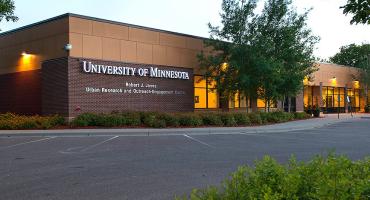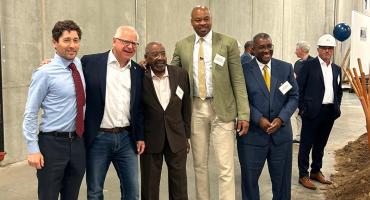
Carlson School Partnership Helps Bring Jobs to North Minneapolis
Monday, July 1, 2024
By Charly Haley
Former NBA player and current business developer Devean George recently broke ground on a modular housing facility that will bring 166 full-time jobs to north Minneapolis.
That number of jobs was determined, in part, by research from students at the Carlson School of Management.
The students, part of the Carlson Ventures Enterprise (CVE) program, divide into teams each semester, supporting several clients—from start-ups to corporations to mission-driven collaboratives like the Northside Job Creation Team (NJCT)—to study potential business ventures and provide recommendations. CVE typically serves six or seven clients a semester.
George’s company, George Modular Solutions, partnered with NJCT, an initiative of the University of Minnesota’s Robert J. Jones Urban Research and Outreach-Engagement Center (UROC). NJCT works with community partners and businesses to bring living-wage jobs to north Minneapolis. The effort includes consultation with CVE students, who analyze potential job creation opportunities.
The students’ analysis for George Modular Solutions predicted strong success, helping to propel the multimillion-dollar project forward. While 166 jobs will be created immediately, that number is expected to grow to more than 300 in the coming years.
“This is a good example of the kind of impact we can have by working together,” said Toby Nord, professional director of CVE.
A 10-year partnership
The George Modular Solutions project comes after more than 10 years of partnership between the Carlson School and the Northside Job Creation Team.
“Applied research is when research has its greatest impact on community, and all of the Carlson School’s research for NJCT is being applied,” said Bill English, consulting project director for NJCT.
Formed in 2012, NJCT works to reverse the shortage of living-wage jobs in north Minneapolis, which historically has had higher rates of unemployment than other parts of the city. Multiple factors contribute to this disparity, including generational poverty and lack of access to transportation.
Because of these challenges, “you have to bring jobs to where people are,” English said.
Initially, NJCT partnered with the Carlson Consulting Enterprise (CCE) to identify industries in which job creation could have the greatest economic impact in north Minneapolis. CVE came on board a couple of years later to provide research for specific projects.
Over the years, Carlson School students have helped NJCT’s community partners make decisions about potential business ventures, including recommendations of how many people to hire, what parts of a business could expand, or whether a project is even worth the investment at all.
In cases where the students’ research shows an idea is not viable, the data is still helpful. “It gets people thinking about, ‘Is this really a good activity that we should be putting some of our work effort and money behind?’” said James De Sota, NJCT executive committee member.
Overall, De Sota said, “The students from Carlson have been fantastic. They’ve provided amazing, well-respected research, and it has really helped in these decision-making processes for all those involved.”
Real-world experience
Along with serving the community, students who’ve worked with NJCT have gained invaluable learning experiences.
“Having a 10-year partnership means upwards of 50 students have had a chance to be impacted by this,” Nord said. “There’s some pride in helping this organization try to do something really cool. … Today’s students are interested in doing the right thing and doing good, and this is an opportunity to not only practice the analysis, but also, it gives them a chance to, as we say at Carlson, use business as a force for good.”
English agreed, saying that what students learn with NJCT goes beyond conducting research.
“The projects that these people have worked on have exposed them to some of the challenges happening in marginalized communities and urban communities all over the country,” English said. He hopes the students will carry an awareness of these issues into their future work and careers.
Eric Wentworth, a current MBA student who was on the team that worked with George Modular Solutions, said seeing the community impact of the project was inspiring.
“Helping them develop insights to the market and generate ideas for new possible revenue streams they can explore to quickly grow their business has been incredibly rewarding,” he said. “The community support for this venture has been exciting to see, and I can’t wait to follow their story as they grow their business and fulfill their mission with NJCT to provide living-wage jobs for residents of north Minneapolis.”
Continuing to collaborate
The George Modular Solutions project has received a lot of public support and media attention, largely focused on the former NBA star’s commitment to investing in the north Minneapolis neighborhood where he grew up.
But to Nord, the project also exemplifies the lasting partnership between NJCT and CVE.
“We’ve had a mutually beneficial, really great working relationship that’s culminated in supporting the fairly visible creation of George Modular Solutions,” Nord said.
English added that he hopes the attention on this project and the partnership with the Carlson School could inspire other organizations to collaborate with NJCT, bringing even more resources and expertise to the mission of creating living-wage jobs in north Minneapolis.
“The Carlson School has provided leadership for [others] to realize that this effort is worth getting involved in, and to understand the importance of bringing their own interests and research to urban problems,” he said.
Top photo: George Modular Solutions broke ground on June 18, 2024. (Photo courtesy: City of Minneapolis)



